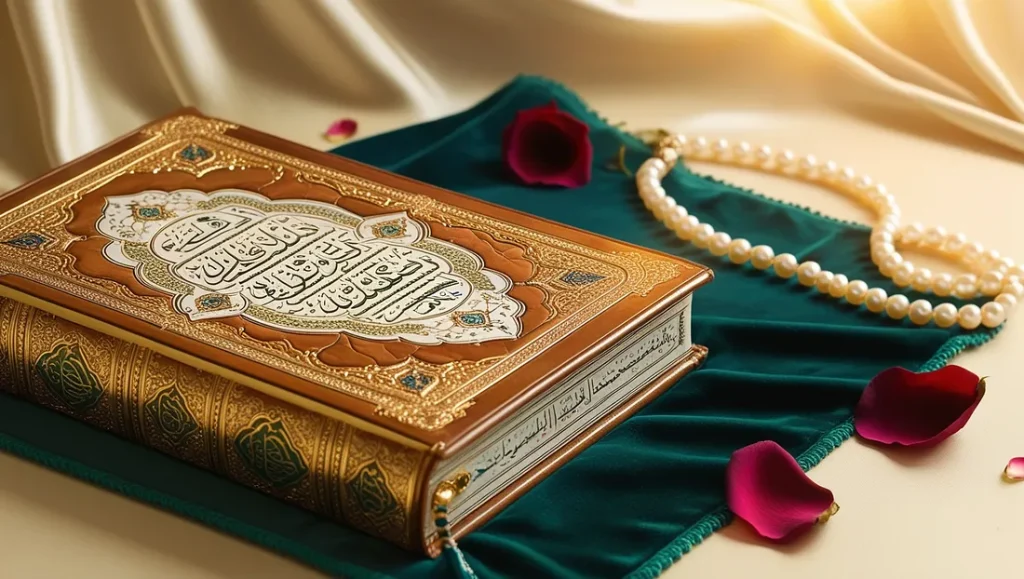
Muslims around the globe consider the Quran as a holy text given to Prophet Muhammad (PBUH) through Angel Jibreel (Gabriel). For them, it is held as the direct word from Allah (God). Written in Arabic, it consists of 114 Surahs (chapters) divided into more than 6,000 verses called Ayahs. The Quran is different from other religions as it has not been altered since it was revealed over 1,400 years ago. Each human is guided through this book. It is the last and most detailed book that was given to humanity.
The rest of the article will delve into the reason behind the themes, importance, origin, breakdown, and impact of the Quran, accomplishing my goal to better explain its importance to billions around the world. You will know about what is the Quran.
The Revelation and Compilation of the Quran
1. How Was the Quran Revealed?
The verses of the Quran were revealed to the Prophet over 23 years, starting when he was 40 years old in 610 CE. The first verses were shown to him while he was meditating inside the Hira Cave. He was instructed to read and was then informed by angel Jibreel to open the Surah titled Al-Alaq (96:1-5).
His prophethood came with the revelations spread throughout his life regarding norms and instruction for people and society, which were intended to overcome particular events and problems. All the verses were memorised and recorded by the scribes under the supervision of the prophet to ensure the veracity and conservation of the verses.
2. The Quran Compilation – How was it done?
During the lifespan of Prophet Muhammad (peace be upon him), the Quran was mostly memorised and recited, but it was also documented on parchments, palm leaves, and bones. He also had a plethora of followers who were keen to write it down. After his death, Caliph Abu Bakr (may Allah be pleased with him) initiated the first formal documentation of the Quran to make sure it was retained.
Subsequently, during the Caliphate of Uthman ibn Affan (may Allah be pleased with him), copies were made of the text for distribution to various regions so that the Quran could not be tampered with, revised, or changed in any way. The truth remains that every copy of the Quran around the world is the same, which attests to the claim that it has been preserved.
The Quran structure follows as the language combines all parts of the worship, making it rhythmically and easy to memorise and recite. It is subdivided into 14 Surahs (chapters), dedicated 30 Juz (sections) for more fluent reading, and accompanied with over 6000 Ayahs (verses).
The Structure and Language of the Quran
The Quran is written in rhythmic, poetic Arabic, making it easy to memorize and recite. It is divided into:
- 114 Surahs (chapters)
- 30 Juz (sections) for easier reading
- Over 6,000 Ayahs (verses)
- Makki Surahs (revealed in Makkah) – focus on faith, Tawheed (oneness of God), and the Hereafter
- Madani Surahs (revealed in Madinah) – focus on laws, community, and daily life
The Quran’s language is miraculous, with unparalleled eloquence, depth, and literary
Themes Of The Quran
The Quran covers a vast range of spiritual, moral, legal, and historical topics. Some of its main themes include:
1. The Oneness of God (Tawheed)
The most fundamental concept in the Quran is the belief in one God (Allah), who is the Creator, Sustainer, and Judge of all things.
“Say, He is Allah, (who is) One. Allah, the Eternal Refuge.” (Surah Al-Ikhlas 112:1-2)
2. Guidance for Humanity
The Quran provides practical guidelines for living a righteous and meaningful life, covering morality, justice, kindness, patience, and worship.
“Indeed, this Quran guides to that which is most upright and gives glad tidings to the believers.” (Surah Al-Isra 17:9)
3. Narrations of Former Prophets And Peoples
The Quran offers the accounts of prophets Adam, Noah, Abraham, Moses, Jesus, and others to instil concepts of belief, perseverance, and mercy.
“Surely in their stories, there is a reflection for the people who understand.” (Surah Yusuf 12:111)
4. The Hereafter (Akhirah)
The Quran continuously warns believers on the certainties of death, life after death, resurrection, and the last judgment.
“Indeed We have created you, and then fashioned you, then We said to the angels, ‘Prostrate to Adam,’ and they fell prostrate, all except for Iblees (Satan)” (Surah Al-A’raf 7:11)
5. Scientific And Natural Phenomena
Various verses describe the development of the human embryo, the expansion of the universe, the water cycle, and more, all of which have now been substantiated by science.
“The life of everything alive was made from water.” (Surah Al-Anbiya 21:30)
The Effect of the Quran on Human Life
The Quran is a guide for Muslims. Unlike a religious book that only has doctrinal significance, it guides every part of a Muslim’s life including:
Faith – Daily recitation and contemplation of the Quran increases one’s faith.
Religion – Gives laws on how to be charitable, truthful, and just in all affairs.
Politics – Provides laws and regulations regarding family relations, trade, and politics.
Psychology – Gives tranquillity and solace in times of anxiety.
Muslims are of the view that adherence to the Quran guarantees success in this world and in the afterlife.
FAQs
1. What distinguishes the Quran from other religious texts?
Unlike many religious scriptures, the Quran has never undergone modification and is stated by followers to be the complete and undistorted final word of God – as revealed to the prophet Muhammad.
2. Is it possible to translate the Quran into other languages?
While translations of the Quran exist, those who practice Islam consider them to be interpretations of the meaning rather than the actual Quran. Only the original Arabic text is considered the Quran.
3. What accounts for the large number of people who have memorised the Quran?
Countless Muslims across the globe memorise the Quran as a way of preserving the text’s message in a unique way that guarantees its authenticity, being one of the highest forms of Muslim scholarship known as Hafiz.
“Indeed, We have sent down the Reminder (Qur’an), and indeed, We will preserve it.” (Surah Al-Hijr 15:9)
4. In what ways can the Quran be of assistance in one’s daily life?
The Quran motivates individuals to make sound decisions through its moral, spiritual, and practical teachings, thereby enhancing one’s relationship with Allah.
5. Are non-Muslims allowed to read the Quran?
Yes, any non-Muslim is encouraged to read the Quran through its translations to get an insight into Islamic values, spirituality, and ethics.
Conclusion
Here is the answer to your question, what is the Quran? The Quran provides revelation, guidance, laws, and instructions for every aspect of life for the educated and uneducated. Its verses equip one with reasoning which aids in solving moral, social, and even economic problems. For an individual to appreciate and remain devoted to the noble way of life, understanding the teachings and making the recitation of the Quran enables that. This is the only way people can live a blessed life.
For the last one thousand four hundred years, the Quran has served as a beacon of light and consideration, forever changing people’s lives and entire civilisations. Its wisdom continues to reiterate its timelessness. May we all gain from its guidance and light. Ameen.
